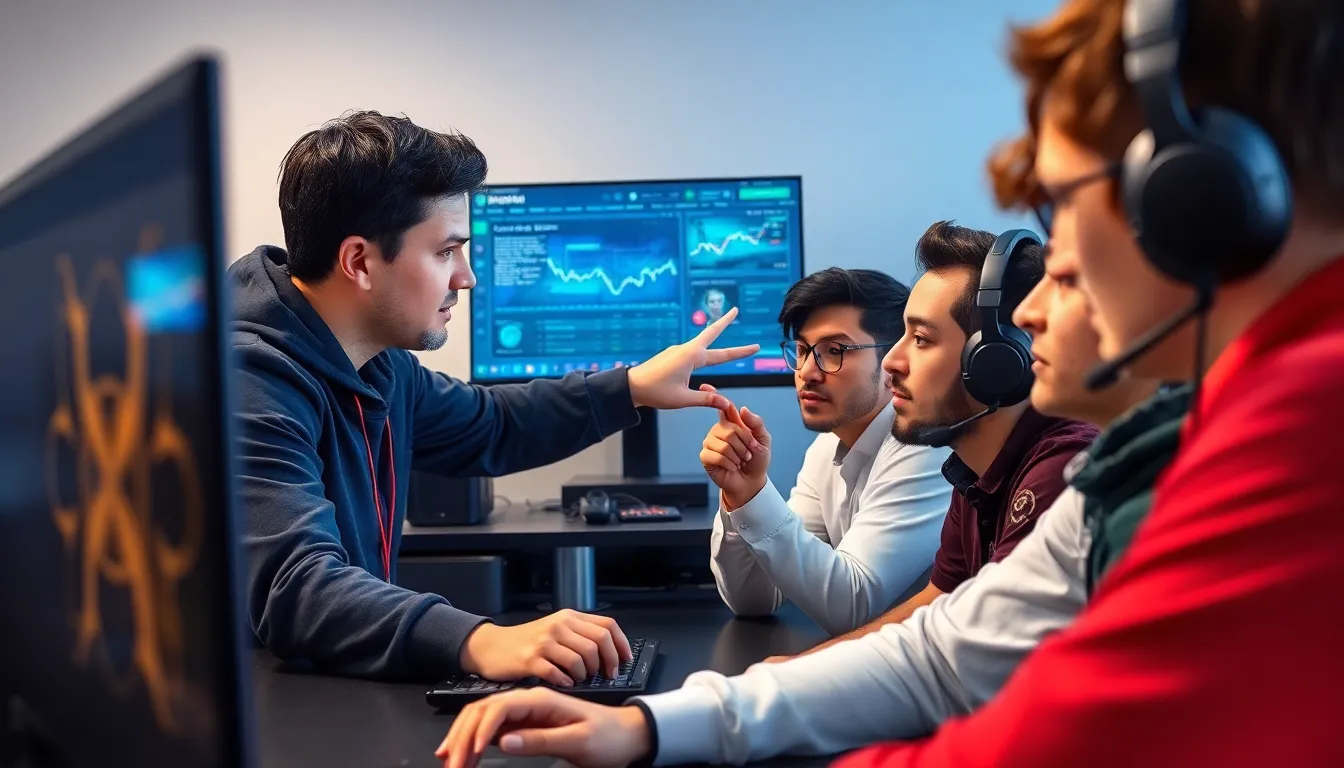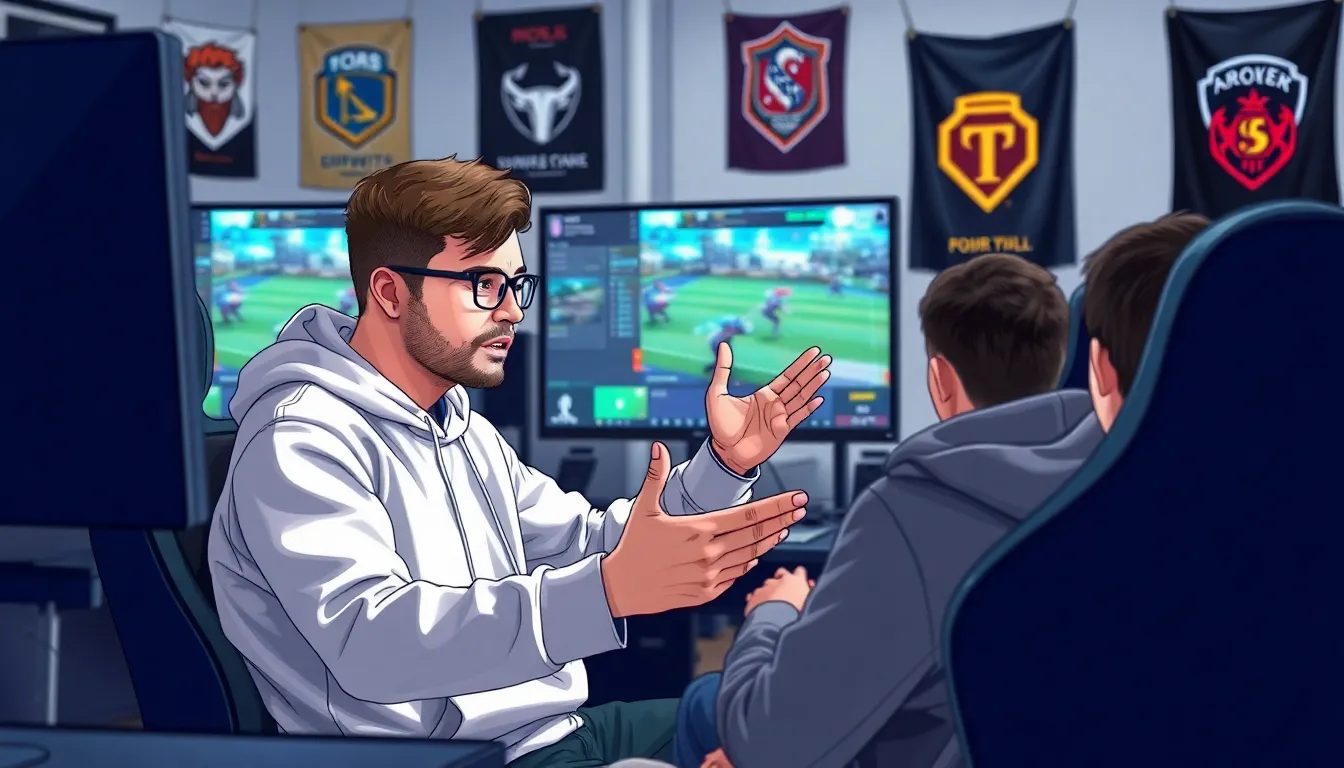In the fast-paced world of esports, where every millisecond counts and strategy reigns supreme, having a coach can make all the difference. Think of esports coaching as the secret sauce that transforms a good player into a great one. It’s not just about yelling “go, go, go!” from the sidelines; it’s about honing skills, analyzing gameplay, and developing winning strategies that leave opponents in the dust.
esports coaching
Esports coaching involves guiding players to maximize their potential in competitive gaming environments. Coaches provide specific insights that help players improve their skills, analyze gameplay, and develop winning strategies. Transforming a player into a top contender requires a thorough understanding of games, mechanics, and psychology.
Skill development forms the heart of effective coaching, focusing on enhancing individual abilities. Coaches implement drills tailored to a player’s strengths and weaknesses. By providing constructive feedback, they highlight areas that need improvement.
Gameplay analysis plays a critical role in esports coaching. Coaches review match footage, identifying patterns and mistakes that players might overlook. This analysis enables players to refine their decisions during high-pressure situations. Identification of in-game tendencies allows for strategic adjustments.
Strategic planning combines gameplay knowledge with situational awareness. Coaches help players develop adaptable strategies that address diverse opponents. This planning incorporates game theory principles, ensuring that players can outsmart their rivals. With defined objectives for each match or season, teams can align their efforts efficiently.
Communication between coaches and players elevates the coaching experience. Regular discussions foster a supportive environment where players feel encouraged to express concerns. This collaboration builds trust, essential for navigating the competitive landscape of esports. Relationships formed through honest dialogue can motivate players to strive for excellence.
Overall, esports coaching embodies a comprehensive approach that integrates skill enhancement, analysis, strategy, and communication. It equips players with vital tools for success, transforming their gaming experience into a more rewarding journey.
Importance Of Esports Coaching

Esports coaching plays a critical role in maximizing player potential and enhancing competitive performance. Coaches focus on various strategies that empower players to excel in their gaming endeavors.
Skill Development
Skill development serves as the foundation of effective esports coaching. Tailored drills improve player techniques and sharpen abilities in specific game mechanics. Constructive feedback helps identify strengths and weaknesses, allowing players to refine their gameplay. Coaches analyze individual performance to create personalized plans that address specific needs. Players who engage in regular skill assessment often notice significant improvements over time. Mastery of essential skills leads to greater confidence during competitive matches.
Team Dynamics
Team dynamics shape a team’s overall performance in esports competitions. Coaches foster cooperation by encouraging open communication among players. Building trust within a team enhances collective strategy implementation and execution. Collaborative training sessions promote a unified approach to challenges faced during gameplay. Teams that understand each member’s strengths and roles typically outperform their opponents. By enhancing interpersonal relationships, coaching cultivates a positive environment conducive to success and resilience in high-pressure situations.
Types Of Esports Coaching
Coaching in esports can be categorized mainly into individual coaching and team coaching, each serving distinct purposes and outcomes for players and teams.
Individual Coaching
Individual coaching focuses on the personal growth of a player. Coaches tailor their approach to the specific needs and strengths of each player, allowing for personalized skill enhancement. This method involves one-on-one sessions that include targeted drills and detailed performance analysis. Feedback during these sessions aims to facilitate continuous improvement. Players often benefit from customized strategies that address their weaknesses. An effective coach identifies areas for growth, enhancing a player’s confidence and decision-making skills. Players develop a deeper understanding of their gameplay mechanics, which can elevate their competitive edge.
Team Coaching
Team coaching emphasizes the development of group dynamics within a team. Coaches work to improve coordination and communication among teammates, fostering a collaborative environment. Strategies crafted during team sessions adapt to various game scenarios, ensuring that players can respond effectively to opponents. Team coaches analyze group gameplay footage to sharpen tactical awareness and identify collective strengths and flaws. Regular practice sessions emphasize teamwork, encouraging players to support each other. A unified strategy often leads to better performance in matches. By building trust and rapport among team members, coaches create a resilient squad capable of overcoming challenges.
Strategies For Effective Esports Coaching
Effective esports coaching involves various strategies that enhance player performance and foster teamwork. Coaches prioritize setting clear objectives and analyzing performance for optimal results.
Setting Goals
Coaches guide players in establishing achievable goals. Specific targets, such as improving accuracy by a measurable percentage or mastering a particular skill, enhance focus. Breaking larger objectives into smaller tasks simplifies progress tracking. Regularly revisiting these goals ensures that players remain motivated and adjust as needed. Tailoring objectives to individual capabilities makes the process more effective. Encouragement plays a significant role; recognizing milestones helps maintain a positive mindset. Personalized goal-setting sessions create a sense of ownership and commitment among players.
Analyzing Performance
Analyzing performance constitutes a cornerstone of effective coaching. Coaches review match footage to identify both strengths and weaknesses. Detailed breakdowns of player movements and decision-making contribute to strategic improvement. Constructive feedback during analysis sessions fosters player growth. Implementing data-driven insights enables adjustments in gameplay tactics, enhancing overall effectiveness. Establishing a routine for performance review creates consistency in improvement. By using metrics like win rates or kill-to-death ratios, coaches and players focus on measurable outcomes. This objective analysis empowers players to make informed choices in future matches.
Career Opportunities In Esports Coaching
Esports coaching presents various career opportunities across multiple levels of competition. Coaches can work with amateur teams looking to advance their skills or professional teams aiming for championships. Job roles in this field include team coach, individual coach, analyst, and strategist.
Team coaches develop training programs and coordinate practice sessions. They apply their knowledge of game mechanics to help players improve coordination, communication, and teamwork. Individual coaches concentrate on refining a player’s skills, offering one-on-one sessions and personalized feedback.
Analysts play an essential role, focused on data-driven assessments. They review match footage to spot trends and weaknesses, informing both players and coaches. Developing strategic insights from gameplay data enables teams to enhance their competitive edge.
Further specialization exists in mental coaching, where professionals help players manage stress and maintain focus during high-stakes competitions. Mental coaches aid athletes in building resilience and improving their overall performance under pressure.
Additionally, content creators and streamers find opportunities in esports coaching. Those with a strong online presence can leverage their expertise to offer coaching services, reaching a broader audience. Through platforms like Twitch or YouTube, coaches can engage with players, sharing insights and techniques.
Staying updated on industry trends and technological advancements is vital for success. Engaging in networking opportunities and professional development ensures coaches remain competitive. They can foster relationships with players and other professionals, enhancing their reputation in the esports community.
As the esports sector continues to grow, career opportunities in coaching are expanding, offering avenues for passionate individuals to make a significant impact in the competitive gaming landscape.
Conclusion
Esports coaching plays a pivotal role in shaping the future of competitive gaming. By focusing on skill development gameplay analysis and strategic planning coaches empower players to reach their full potential. The blend of individual and team coaching approaches ensures that each player’s unique strengths are recognized and utilized effectively.
Building strong team dynamics fosters cooperation and trust which are essential for success in high-pressure environments. Coaches not only enhance gameplay but also cultivate a positive atmosphere that encourages resilience and growth. As the esports landscape continues to evolve the demand for skilled coaches will only increase. This makes it a promising career path for those passionate about gaming and player development. Embracing the principles of effective coaching can lead to significant advancements both for players and the esports community as a whole.

